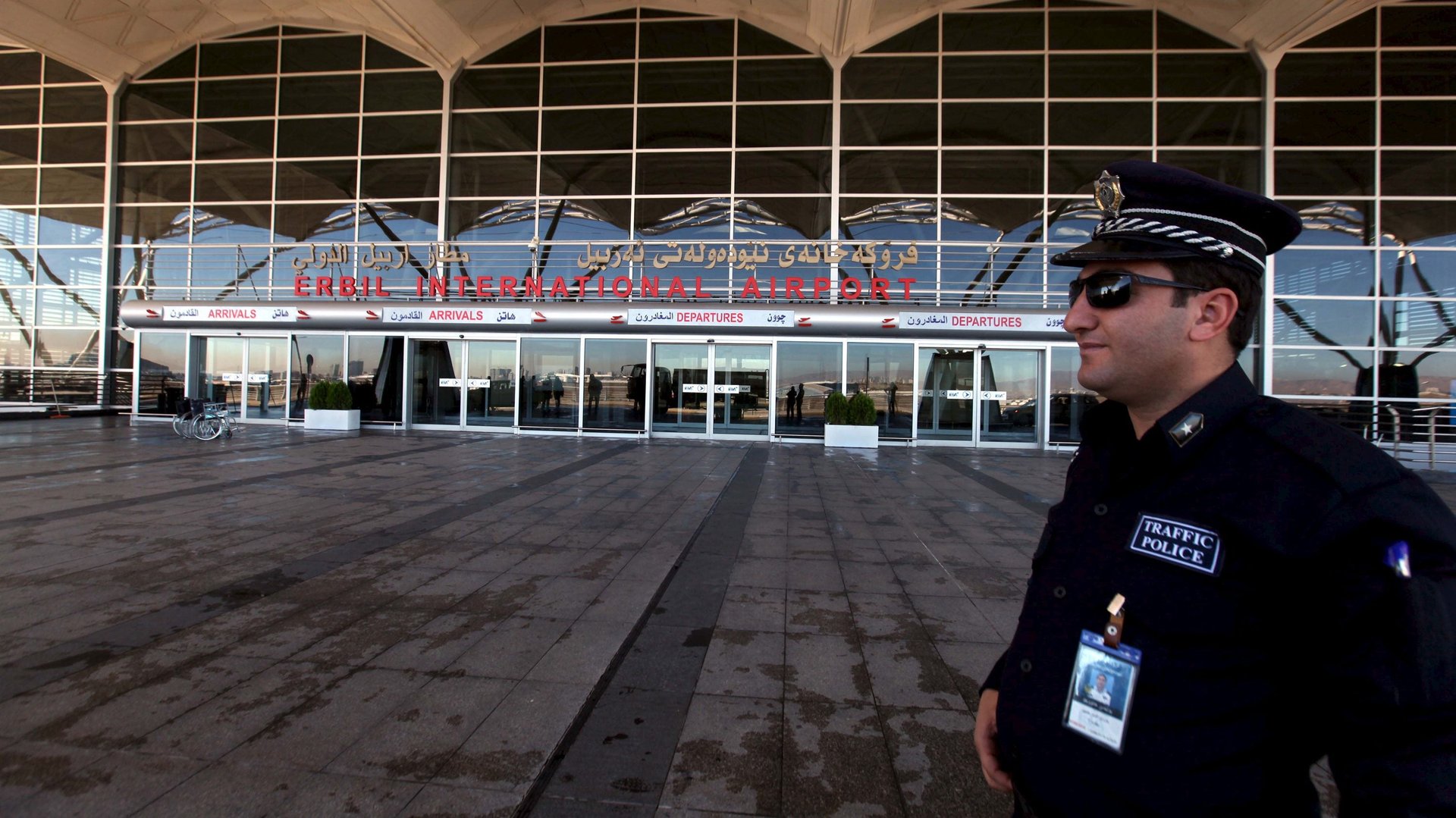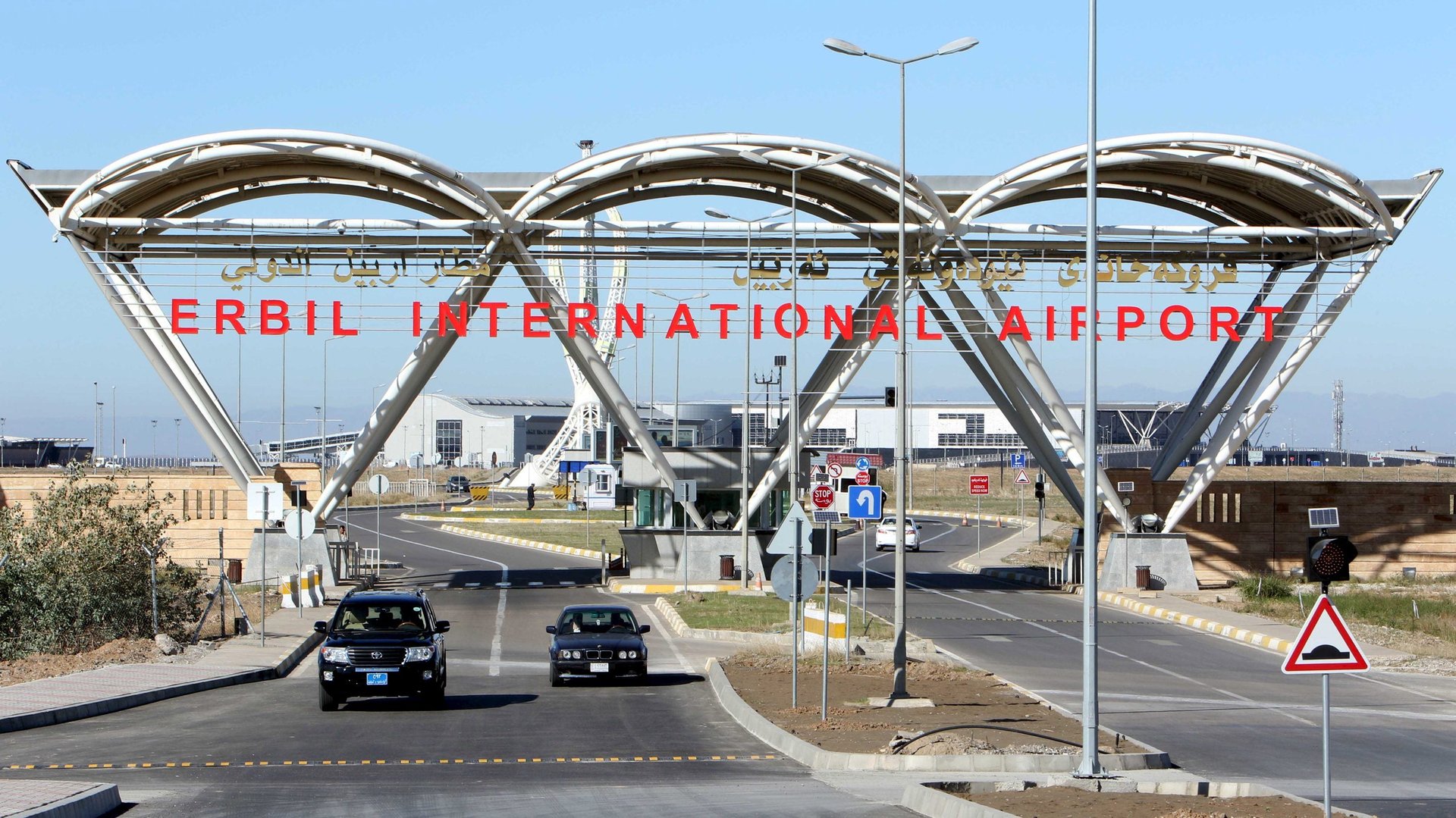How to run an international airport with jihadists on the doorstep
Erbil, Iraqi Kurdistan


Erbil, Iraqi Kurdistan
Running a Middle Eastern airport is fairly challenging at the best of times. There are the lovesick hijackers and the irate music legends; the rogue sons of ministers who force the return of departed planes after they’ve arrived late to the gate.
But for Erbil International Airport the last few years have presented a series of unique problems.
Billed as Kurdistan’s gateway to the world, the airport was until recently a glitzy testament to the booming fortunes of the semi-autonomous statelet in northern Iraq. Oil workers and diaspora Kurds poured in after the toppling of Saddam Hussein in 2003, intent on enjoying the “other, safer Iraq.” Diplomats and big-name developers followed as the territory tiptoed towards independence. The airport became the channel for outside investment, people and ideas: Today 34 countries have a diplomatic presence in Kurdistan, as opposed to just 14 in 2010 when international flights started.
But in the summer of 2014 ISIL, a.k.a. the Islamic State, surged into nearby Mosul. Now its fighters operate as little as 40 miles (64 km) beyond the airport perimeter; some are battling Iraqi and independent Kurdish forces near Makhmour, an hour’s drive southwest of Erbil. Jihadi cells are thought to operate inside the city, and local authorities are mindful of last November’s events in Egypt, where an ISIL affiliate apparently brought down a Russian airliner.
Where once investors spilled out of the glass-fronted terminal and bought up duty-free booze, now American special forces launch secretive nighttime raids from the airport. International arrivals have dropped off, and in their stead heavily laden military cargo planes regularly tear down the three-mile long runway.
Despite attacks elsewhere in the city, airport authorities are at pains to stress that the airport itself is safe. “Luckily until now, we never had any security issues inside the airport,” said Talar Faik, the airport’s director. “Security is very tight.” But it comes at a cost.
Bring in the heavies
With rows of US military Chinook and Blackhawk helicopters parked on the apron, the airport’s management has pulled out all the stops to see off potential threats. Microlight gyrocopters patrol the facility’s expansive perimeter, which is studded with military outposts and watchtowers with blindingly bright spotlights. Because of the risk of car bombs, only official cabs, government vehicles, and chauffeurs of the well-connected can get anywhere near the check-in desks.
On the approach to the airport, all vehicles and passengers are inspected by sniffer dogs. Non-passengers can’t even enter the terminal, but must bid their farewells at a meeting area a mile away. Travelers are screened, scanned, and x-rayed at various points before boarding. A new “anti-terror desk” gives extra scrutiny to potentially fake or suspicious-looking travel documents.
Much of the airport security is managed by the Asayish, the Kurdish internal security service, which is regarded as competent if sometimes brutal. It’s rumored that the security staff are Israeli-trained. (Airport officials declined to comment on this speculation.) Relations between Jerusalem and Kurdish authorities are warm, though talks have often been conducted under the radar.
“It’s a challenge not letting the military affect the civilian operation of the airport,” said Faik as two V-22 Osprey tiltrotor aircraft hovered outside her office. Having turned over the old airport buildings to the international coalition, she says it’s become trickier to coordinate takeoffs and landings. The occasional arrival of coalition jet fighters for maintenance has made scheduling even more problematic.
Despite the tight security, some airlines have had doubts. Several pulled out when it looked as if Erbil might be next in the jihadists’ sights in 2014. Emirates and Etihad, the flagship carriers of Dubai and Abu Dhabi, have subsequently pulled the plug on several occasions. Meanwhile, pilots from a few European carriers fly in and out in using tactics familiar to visitors to Baghdad and Kabul, spiraling down and up in tight corkscrews to minimize their exposure to missiles.
And ISIL can still create havoc, experts say. The group is known to have looted shoulder-fired MANPADS surface-to-air missiles, which can bring down a passenger jet, from Iraqi and Syrian bases. “They would [aim for] civilian aircraft because usually they don’t have counter-measures built in,” said Damien Spleeters, a field investigator for Conflict Armament Research, an organization which tracks illegal weapons in conflict zones.
Fortunately such missiles typically have a short battery life, Spleeters says, and using them correctly requires training. Besides, Kurdish security analysts believe the airport has pushed its perimeter back far enough to make its planes hard to hit.

Iraq’s airport envy
Security isn’t the airport’s only worry. The central government and Kurdish authorities are locked in a fierce tussle over energy revenues and the future of the oil-rich provinces along Kurdistan’s periphery. As the dispute has deepened, officials in Erbil have come to believe that the Iraq Civil Aviation Authority (ICAA), which gives approval for all civilian flights to land, depart and overfly Iraq, has hobbled their prized airport out of sheer spite.
Last year, for instance, Erbil airport was twice ordered to close, supposedly due to the threat of cruise missiles fired from Russian battleships in the Caspian Sea towards rebel targets in Syria. Faik isn’t convinced a total shutdown was necessary. “They simply decided to close Kurdistan region airports only and the rest were open?” she asks. She estimates that the closure cost the cash-strapped local economy $400,000 a day in lost revenue.
She and her colleagues also blame the ICAA for the airport’s antisocial flight times—many leave and arrive in the middle of the night—and limited range of destinations. When an airline wants to operate at the airport, the ICAA chooses the timings, she says. If a new airline wants to fly into Erbil, the ICAA will require it to also open routes elsewhere in Iraq.
“They are always playing those games,” Faik says. “But until we become an independent state we cannot separate from the ICAA.”
The cost of doing war-zone business
For all the fears of a terrorist attack, the real impact of ISIL on the airport—and Kurdistan at large—has been economic.
Air freight, a useful measure of the landlocked region’s economic performance, averaged 1,856 metric tons (1,827 tons) a month last year, down from a peak of 3,214 a month in 2013. The Kurdish government, which owns the airport, is struggling to stave off bankruptcy as it faces low oil prices, an ongoing budget dispute with Baghdad, and the escalating costs of the war.
The airport too has had its budget cut, yet the total volume of passengers has grown over the past two years, according to airport management. With huge numbers of people fleeing conflict and travel by road sometimes dangerous, Iraqis have flown to Kurdistan in record numbers. Before 2014, 93% of Erbil’s flights were international; now nearly half are domestic.
The profile of those landing in Erbil has also changed dramatically. The developers with briefcases full of dollars are gone, their seats now taken by security contractors, journalists, and humanitarian workers—along with the odd foreign fighter drawn to the Kurds’ fight against ISIL. NGO jets clog the runway, as aid organizations rush to supply the 1.5 million refugees and internally displaced Iraqis.
Those Iraqis who can still come to grab some much-needed respite from the even worse rigors of conflict in the south, west and center. Mohammed Bin Assid, a businessman who’s originally from Najaf but now divides his time between Baghdad and Samarra, says he escapes to the Kurdish mountains, an hour northeast of Erbil, whenever time and money allows.
“This is where I find some quiet,” he said. “If I couldn’t come here, I’d have to leave Iraq.”